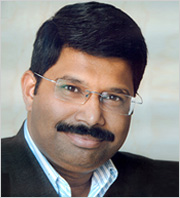From the classic 'Competing for the Future' in mid-90s, to the groundbreaking 'Fortune at the Bottom of the Pyramid' in 2004, to the 'New Age of Innovation' this year, Prof Prahalad has impacted the way business leaders think and act. In his latest book with co-author M.S. Krishnan, also from the Ross School of Business, Prof Prahalad argues that the two key areas of value creation are: focus on individual customers, and garnering resources from a global network.
In Bangalore for a seminar, Prof Prahalad spoke to MBAUniverse.com, on his view on innovation, how companies can excel and what the new age of innovation means for management education. Excerpts:
What is the central premise of your book 'New Age of Innovation'?
We need a new model of customer value creation. In the new approach to business innovation, growth of every business depends on accessing global network resources to co-create unique experience to individual customer, symbolically N=1. Companies should resource goods and services required to develop new offerings anywhere from the world R=G, to import competitiveness. It is about identifying each customer's needs & preferences, problems & working towards providing optimal services, facilities or solutions. Looking at the needs of future customer, The New Age of Innovation will act as a strategic planner which helps in transforming the same.
Two pillars (N=1) & (R=G) of the organization on which would rest the future of it. N=1 states that value is based on unique, personalized experiences of customers. It is about identifying each customer's needs & preferences, problems & working towards providing optimal services, facilities or solutions. Then & only then would the organization reach the ideal target N=1.
Google is a good example of a firm that is built on this framework.
What are the macro factors that have created environment for this new framework?
There are four fundamental drivers of change in the business world:
- Ubiquitous Connectivity: With mobile and internet boom, everyone is connected. 4 billion people are in touch. This is creating a new kind of customer class.
- Convergence of IT: Boundaries of products are melting away.
- Dramatic drop in technology cost: Every day there is a reduction of cost of computing and storage.
- Growth of social network: Facebook and Orkut are such a phenomenon today!
As a result of all these forces, we are seeing a new customer who is interconnected and has very different aspirations from the firm.
How would you define the area of business innovation? It been talked about for a long time…
My view on business innovation is very different from old view which talked about the usual reduction of cycle time and costs...In our book, we say that technology will not be a differentiator; personalized customer experience will be. Companies can no longer bank on 'episodic breakthroughs', as in case of periodic product launches, but will have to constantly engage with customers and create total experience. And, since no company can create the total experience alone, it'll have to access resources from a global network. That's why our view is more holistic.
In which area Indian companies are innovating which can become a global benchmark?
Indian firms are doing well. They are innovating in centres like Bangalore, Noida, Pune and Chennai. There are several areas where they are world beaters. For instance, the HR practices of the information technology industry, particularly in Infosys, TCS (Tata Consultancy Services Ltd) and Wipro, involve innovations in recruitment, training, global talent management etc. They all are operating at a scale which is huge. They have scaled up four-five times in as many years but their HR personnel have not increased in the same proportion. They are processing millions of applications and hiring thousands every month. I think HR practices in top Indian IT firms can be the global benchmark in the HR and recruitment area.
How do you see the area of management education? How can the principles of N=1 and R=G be applied to this domain?
The framework is certainly valid for education and management training domain. Education is essentially about transformation of an individual. So training and education providers must treat each participant as unique and offer a solution that is customized. All individuals aren't same. Coming to the delivery side, no organization and institution has all the knowledge or expertise. They have to seek knowledge by creating alliance, in the county and globally. So N=1 and R=G is the future of management education too.
Is there any institution that's practicing this model…
Not yet, but it will happen. Certainly!





























